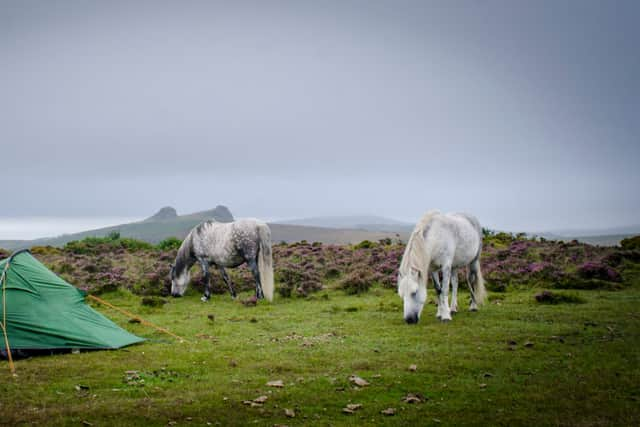Dartmoor wild camping ban: Latest on appeal to overturn ruling - what is wild camping, where is it allowed in UK
and live on Freeview channel 276
A decision which banned wild camping from Dartmoor, could now be appealed by the National Park Authority. The appeal follows a High Court decision in January that said campers would need landowners’ permission.
Dartmoor National Park, designated in 1951, covers a 368-square mile area that features "commons", which are areas of unenclosed privately-owned moorland where locals can put livestock. The DNPA said it was "pleased" to be granted leave to appeal and would now decide whether to proceed.
Advertisement
Hide AdAdvertisement
Hide AdDNPA had argued at the High Court that wild camping was a local custom and the banning it was an "attack" on a "long-established practice of great importance". The case to ban wild camping was brought forward by landowners Alexander and Diana Darwall.
Mr and Mrs Darwall, who keep cattle on their 3,450-acre estate, claimed some campers caused problems to livestock and the environment. Their argument secured a finding from a judge that a 1985 law that regulates access to moorlands does not provide a right to wild camp.
Previously, before the judgement, there was an assumed right that people could camp without landowners’ permission. Campers are now restricted to specific areas, marked on an interactive map published on the park authority’s website.
Thousands of protesters gathered on Dartmoor after the ruling calling for it to be overturned. According to campaign group Right to Roam, 18% of available land had been lost due to the ruling. DNPA members will discuss appealing the ruling at a meeting of its members on 14 April.
What is wild camping?
Advertisement
Hide AdAdvertisement
Hide AdWild camping is the practice or activity of camping in the countryside rather than in a campsite or other organised setting. It could be in the countryside, on beaches, on the mountainside or in a field.
During Covid lockdown, the practice became popular with families and groups wanting to get away when travel to countries abroad was restricted. However, many failed to treat areas with respect, leaving litter and lighting campfires in dangerous areas.
Where can you go wild camping in the UK?
Wild camping without the landowner’s permission is illegal in most of England, Wales and Northern Ireland. However wild camping in Scotland isn’t prohibited, so that means you can technically camp wherever you like in Scotland. However, some areas of Scotland now require a permit.


Anyone wanting to camp in the Loch Lomond and The Trossachs National Park now need a permit - or have to choose an official campsite - because bye laws have been introduced. It follows damage to the environment due to overuse.
Elsewhere in Scotland, anyone wanting to wild camp need to abide by the ‘leave no trace’ guidelines to avoid damaging the natural environment and disturbing wildlife.
Comment Guidelines
National World encourages reader discussion on our stories. User feedback, insights and back-and-forth exchanges add a rich layer of context to reporting. Please review our Community Guidelines before commenting.
